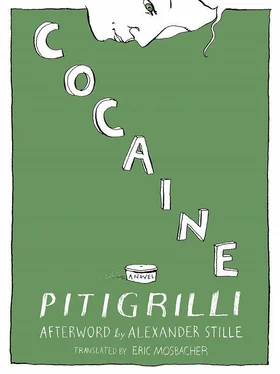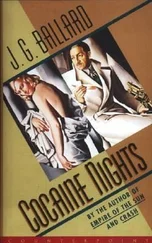“I’m not hungry,” Nocera said.
“I couldn’t touch a thing,” said Maud.
Nocera sighed. Maud sighed.
“Oh, well.”
“All the same, we can’t fast for a month. Shall we go to a restaurant?”
“I couldn’t eat a thing.”
“Neither could I.”
“Perhaps a little soup.”
“Or an egg.”
Nocera gave the cabman the name of a restaurant, and Maud thought it right to weep a little.
And she wept a little while the taciturn Nocera recalled the Dantesque spectacle of the body in the furnace.
And so they arrived at the restaurant without noticing it. A whole hierarchy of waiters hurried to offer them seats and take their coats. Maud was not hungry. She couldn’t touch a thing, and nor could Nocera, but they ate all the same.
The bill amounted to 180 lire, which was not expensive considering that it included the liquor necessary to wash down the lobster and the partridges seasoned with truffles.
“How sad going home is.”
“Suppose we go to a show?”
“It would be sacrilege.”
“Not to enjoy ourselves, but to take our minds off our grief.”
“What’s on?”
“The Pills of Hercules.”
“Is it very dirty?”
“Yes.”
When the show was over, Nocera took her home in a cab and let her choose which urn she wanted.
“It’s all the same,” she said, picking one at random. Never was a dead person’s estate shared out so amicably.
Nocera put the other urn in his pocket and got back into the cab.
How shabby the modest flat seemed to the woman who was used to grand hotels and smart villas.
She had been back in Turin for several weeks, after dancing her last dance under the Senegalese sky, and she still had a little African fever in her blood. She had come back to Turin to retire from life, to shut herself up in the humble room in which she had lived as a girl.
She found old picture postcards, empty sweet boxes, disintegrating novels with the first pages missing, yellowed shorthand notebooks, material for blouses, faded ribbons; also she found old memories: the exact spot where Tito had kissed her for the first time, the door against which she had been taken, standing, as one transfixes a butterfly, by a man whose name she didn’t even know, on an August afternoon when passion had flared up inside her.
It would have charm, melancholy charm, she thought, to shut herself up for ever in that room to live and die of memories. She locked herself up in it, full of remorse for not having been faithful to Tito, or at least for not having given him the illusion of being faithful to him. But now she offered him eternal fidelity. He was to be her last lover, as he had wanted.
She laid her chinchilla fur coat on the bed, prepared a soft resting place in the corner of the room for the small live dog that was a perfect imitation of a stuffed one, and was inconsolable at the departure of Pierina, her invaluable lady’s maid, whom she had sent on unlimited leave.
The room was full of trunks, on the lids and sides of which were the names of ships and hotels. The furs and coats exuded the odor of Avatar.
On a table by the window that served as a desk there was a photograph of Tito, and on a piece of old lace there was the urn, spherical and shiny and full of gray powder.
The gray powder was Tito. Was it one of his legs? Or his head and an arm? Two thighs and the neck? Heaven knows what part of him had come to her as her share. And how everything had lost its shape in that yellowy gray powder that might have been a Rachel face powder.
Surrounded by these memories, she said to herself, I shall be able to prepare myself for death.
Nocera paid the doctors, the chemist and the undertaker, and then went to the parish church.
“How much does it come to?” he asked.
The bill was waiting for him, already receipted. He paid up without asking for a reduction, though one of the eight priests (at twenty-five lire each) had been lame.
He also paid other persons involved in the funeral. Who knows why so many people have to be mobilized when someone dies? The day will come when dead bodies are simply thrown into canals like dead cats.
He carried out the deceased’s last wishes, wrote a few letters of thanks, and collected the last things remaining in his room. A pair of shoes were still under the bed.
Oh, the shoes of the dead, what a painful sight they are. Those black objects that preserve the shape of something that no longer exists.
In Paris, Pietro Nocera had never had occasion to see Maud. If he had seen her among all those electrifying Parisian women, he would have noticed nothing but her wretched Italian provincialism.
But as soon as he saw her in Turin he was swept away by the exquisite Parisian fascination of that great female globetrotter. Her devotion to his sick friend moved him; and the distance between sympathy and sensuality is as short as that which separates those two words in the dictionary.
One morning — three days after the funeral — Maddalena was drinking her breakfast coffee on the balcony overlooking the courtyard when they brought her a letter. She read it through once only, then wrote on the first sheet of paper that came to hand:
Dear Nocera, you don’t love me. You think you love me. Don’t write to me like that again. I shall never be yours or anyone else’s. Tito is to be my last lover.
Next day they brought her another letter, in which Nocera expressed a wish to kiss her magnificent body. After consulting the mirror, which reflected the whole of her form, she sat down and replied:
“ Dear Nocera, my body is finished. I can’t love any more, and I don’t want to be loved either. My last lover was poor Tito, to whom I shall be faithful for ever. ”
Next day she expected another letter, but none came. She waited two days, three days, with increasing anxiety.
Why didn’t he write?
“Here’s a letter for you, Maddalena.”
“Thank you, papa.”
It was a last passionate letter from Nocera, who implored her to come to his house in an almost poetical street in a quiet district. He said he loved her, wanted her, needed her, her flesh and her perfume.
Maddalena remained thoughtful for a few moments, took a card and an envelope, and with a calm, spring-like smile wrote:
I’ll be at your place at four o’clock. Kiss me.
She looked for a sheet of blotting paper, but there wasn’t one. She looked all round. There wasn’t even any sand. But in front of her eyes, on an old lace mat, there was a shiny, mother-of-pearl sphere full of a yellowy-gray powder that looked like Rachel face powder.
She carefully lifted it, gently poured some powder on to the card on which the ink was still wet, carefully shook it to dry the ink, and then bent the card and poured the powder back into the urn. She put the card in an envelope, gave it to the postman, and remained thoughtful for a moment as brief as a pause in a piece of music.
She bit her lower lip to make it swell, dried it on her upper lip, and then slowly and skillfully passed her rouge pencil over both.
She took a small key from her key ring, the one that opened her flat cabin trunk.
She felt as light and luminous in spirit as an Andalusian mantilla.
She improvised a song with her mouth shut, knelt in front of the innumerable pairs of stockings and chose the thinnest, the pair that most exposed her flesh.
In 1920, at the age of just twenty-seven, a young Italian named Dino Segre, writing under the pen name Pitigrilli, achieved overnight success and notoriety with a book of short stories called Luxurious Breasts , followed the next year by the novel Cocaine , and a second book of stories entitled The Chastity Belt .
Читать дальше



